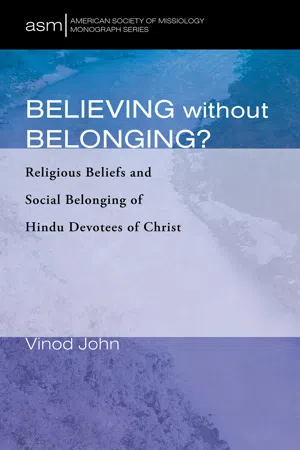
Believing Without Belonging?
Religious Beliefs and Social Belonging of Hindu Devotees of Christ
- 250 pages
- English
- ePUB (mobile friendly)
- Available on iOS & Android
Believing Without Belonging?
Religious Beliefs and Social Belonging of Hindu Devotees of Christ
About this book
This study examines an indigenous phenomenon of the Hindu devotees of Jesus Christ and their response to the gospel through an empirical case study conducted in Varanasi, India. It analyzes their religious beliefs and social belonging and addresses the ensuing questions from a historical, theological, and missiological perspective. The data reveals that the respondents profess faith in Jesus Christ; however, most remain unbaptized and insist on their Hindu identity. Hence, a heuristic model for a contextualized baptism as Guru-diksha is proposed. The emergent church among Hindu devotees should be considered, from the perspective of world Christianity, as a disparate form of belonging while remaining within one's community of birth. The insistence on a visible church and a distinct community of Christ's followers is contested because the devotees should construct their contextual ecclesiology, since it is an indigenous discovery of the Christian faith. Thus, the "Christian" label for the adherents is dispensable while retaining their socio-ethnic Hindu identity. Christian mission should discontinue extraction and assimilation; instead, missional praxis should be within the given sociocultural structures, recognizing their idiosyncrasies as legitimate in God's eyes and in need of transformation, like any human culture.
Frequently asked questions
- Essential is ideal for learners and professionals who enjoy exploring a wide range of subjects. Access the Essential Library with 800,000+ trusted titles and best-sellers across business, personal growth, and the humanities. Includes unlimited reading time and Standard Read Aloud voice.
- Complete: Perfect for advanced learners and researchers needing full, unrestricted access. Unlock 1.4M+ books across hundreds of subjects, including academic and specialized titles. The Complete Plan also includes advanced features like Premium Read Aloud and Research Assistant.
Please note we cannot support devices running on iOS 13 and Android 7 or earlier. Learn more about using the app.
Information
Introduction
Table of contents
- Title Page
- Tables
- Foreword
- Acknowledgments
- Abbreviations
- Chapter 1: Introduction
- Chapter 2: Caste, Community, and Christianity
- Chapter 3: Varanasi: Socioreligious Significance and Response to Christian Missions
- Chapter 4: Varanasi: Hindu Devotees of Christ, Their Religious Beliefs, and Social Belonging
- Chapter 5: Faith and the Hindu Community
- Chapter 6: Believing in Christ as Hindus
- Chapter 7: Belonging to Christ as Hindus
- Conclusion
- Appendix A: Maps of India and Uttar Pradesh
- Appendix B: Open-ended Interview Schedule for Study Respondents in Varanasi, India
- Bibliography